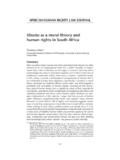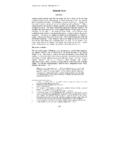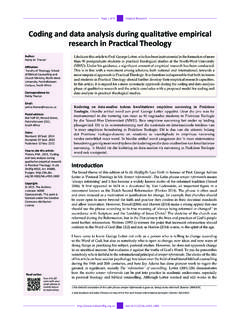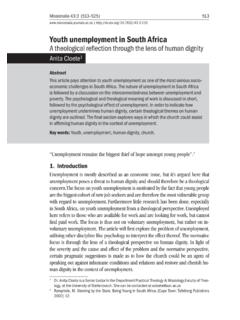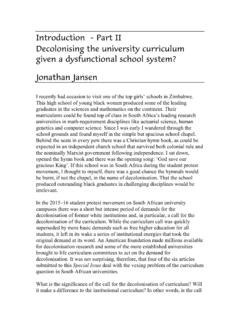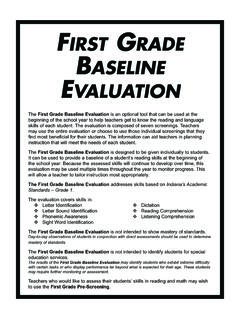Transcription of The school readiness performance of a group of Grade R ...
1 1 Ona Janse van Rensburg The school readiness performance of a group of Grade R learners in primary schools in the Gauteng Province of South Africa Abstract Grade R is the year before learners in South Africa start formal schooling and has been part of the General Education Training Band (GET) since 1998. New efforts are being made to enable all five- to six-year-olds to attend a Grade R class. The nine provinces of South Africa approach this problem in different ways. Some of them, like Gauteng, try to establish Grade R classes at primary schools, but in the process seem to appoint many teachers with only minimum qualifications. This article reports on research requested by the Gauteng Department of Education about the school readiness of Grade R learners. The school readiness performance of 114 Grade R learners was measured by means of a standardized school readiness test.
2 The results confirmed the worst fears of department officials: most of the participants were not school ready after attending a year in a Grade R class. The article concludes with some recommendations, among others that attention should be given to the qualifications of teachers and that parents should become more involved. Keywords: school readiness , school readiness test, school readiness performance , Grade R, kindergarten Ona Janse van Rensburg, North-West University. Email address: Introduction After the 1994 first democratic elections in South Africa, the nine provinces in South Africa were each allowed to manage its departmental preschools in its own way. The Gauteng Department of Education (GDE) closed all preschools in 2001, and in recent years reopened Grade R classes at primary schools.
3 Unfortunately, most of the teachers appointed in Grade R classes only possess the minimum qualifications required for this specialized work. Unsurprisingly, officials of the education 2 department of South Africa s most populous and economically most progressive province, Gauteng, became concerned about the fact that Grade R learners in preschool classes at primary schools in the province did not attain school readiness . In collaboration with a university, the GDE then launched an investigation into the situation in two areas of the province, one in the north and another in the south. The Department of Basic Education grades schools into quintiles based on their equipment and other available resources, as well as the socio-economic area in which the school is situated, with quintile five being the highest and quintile one the lowest on the scale (RSA DBE 2011).
4 Quintile one to three schools are usually no-fee schools, though school fees are not compulsory in public schools in South Africa. The purpose of this article is to report on the findings of research about the school readiness levels of Grade R learners in Grade R classes attached to quintile one to five primary schools in the Gauteng province. The article is structured as follows: It commences with a brief background sketch of education in general in South Africa, and Early Childhood Development (ECD) and Early Childhood Education (ECE) in particular. This is followed by a discussion of the problem that was investigated, an outline of the conceptual and theoretical framework that served as the basis of the empirical investigation, a discussion of the empirical research design, the findings of the research, and a discussion thereof.
5 The article concludes with a number of recommendations. Background The importance of school and learning readiness at the time learners enter school is well established (Abott-Shim, Lambert & McCarthy 2003; National Forum on Early Childhood Policy and Programs 2010). Grade R (kindergarten) has formed part of the Foundation Phase ( Grade R to Grade 3) education policy since 1998. Former national Minister of Education Kadar Asmal wished Grade R to be compulsory for every five- to six-year-old child from 2010, enjoining the departments of education of the provinces to commit to the implementation of the preschool year as a priority in 2010; this target was later extended to 2014 by President Jacob Zuma (Zuma 2009). According to the current National Curriculum and Assessment Policy Statement (CAPS), there are certain assessment standards that should be achieved by the end of the Grade R year.
6 A Grade 1 learner is expected to be physically, cognitively, affectively, normatively, socioculturally and linguistically ready for a solid start to his or her school career (Powell 2010). Linguistic and cognitive 3 readiness implies that a learner is able to understand the concepts used in the language of learning and teaching (LOLT) of the Foundation Phase. Annually, approximately one million learners are admitted to Grade 1 in South Africa. Previously only about 50% of children had the privilege of attending a cr che, a nursery school or Grade R class before entering Grade 1 (Rademeyer 2001). Recent studies have shown that the percentage had increased to 71% in 2009 (RSA DBE 2011). If learners are not school ready (Ladd, Birch & Buhm 1999; Lally 2010), they may suffer from learning problems in formal education.
7 The research problem Children entering Grade 1 should be able to understand the concepts used in the language of learning and teaching (LOLT) of the school that they will attend for the first time. Conceptual understanding is much more than only factual knowledge. The problem in South Africa is that many Grade 1 learners do not receive school instruction in their home language. This problem is exacerbated by the fact that (since 2004) many primary schools enrol Grade 1 learners if they turn six before the end of June of the year that they enter Grade 1, even if they have not attended a Grade R class. From a developmental point of view this complicates the task of Grade 1 teachers, as it means that some Grade 1 learners can be five and a half years old and others seven years old.
8 The problem is further compounded by the fact that there is an ever-widening gap in South African society between the achievement of previously advantaged learners and learners from disadvantaged backgrounds. Inequalities therefore exist even before children start formal schooling (Hoadley 2013; Lee & Burkam 2002). For instance, not all children from previously disadvantaged areas have access to Grade R classes yet, as the preschool year is not compulsory and may not be funded by government. This means that learners from disadvantaged groups may not have access to learning readiness programmes that might help to close the gap between the advantaged and the disadvantaged. The situation of children from disadvantaged areas is further worsened by the fact that their parents often have poor parenting skills, which results in poor involvement in their children s development and learning.
9 In order to address this problem, churches, charities and other non-governmental organizations (NGOs) started intervention programmes for preschool children in disadvantaged areas. The national Department of Education began to address this problem by making the implementation of the preschool year ( Grade R) a priority as from 2010 (Beeld 2008; Pandor 2005; SAQA 2007; UNESCO 2006). According to the 2006 UNESCO International Bureau of Education (IBE) profile, around 500 4 000 learners were enrolled for Grade R classes in South Africa during 2005 (UNESCO 2006). The target for 2010 was to have all preschool learners (approximately one million) enrolled in accredited Grade R programmes (ibid) (as mentioned, this date was later extended to 2014).
10 South-Africa therefore developed a need for a vast number of additional qualified teachers for the Grade R year. In the meantime, the GDE has been appointing practitioners with level 1 and level 4 training in Grade R classes and encouraging under- or unqualified ECE practitioners and teachers, especially those responsible for Grade R education, to acquire the necessary specialized and accredited level 6 qualifications (Pandor 2005). The research question addressed in this paper pertains to the school readiness of a sample of learners in an attempt to determine whether Grade R learners in Gauteng schools achieve the required levels of school readiness , and if not, what obstacles do they encounter? Conceptual framework Early childhood development and education In many cultural groups, a child is defined as a young person who has not yet come of age (irrespective of how that age is defined).
